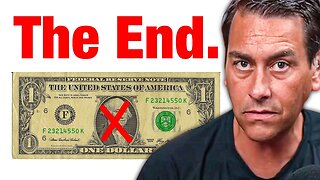Dollar Doomsday! (What You Must Know)
Today marks a momentous occasion—the end of the dollar's reign as the United States' last known superpower. It's a day filled with mixed emotions, as the significance of this event cannot be overstated. For decades, the US dollar has held a dominant position as the world's reserve currency, with nearly 60% of the total value of all currencies. However, the dollar appears to be losing its allure.
The news of Saudi Arabia, the world's largest oil producer, considering joining BRICS—a coalition of developing countries—in abandoning the dollar for bilateral trade has sent shockwaves across the globe. This move, coupled with other major economies distancing themselves from the dollar, has created worry and despair within the United States. The nation's financial dominance on the global stage seems to be slipping away.
Understanding the concept of a global reserve currency is essential to grasp the significance of this moment. Throughout history, different currencies have held the prestigious position of being the world's reserve currency. The US dollar ascended to this position after the Bretton Woods agreement and has maintained it for over a century. However, billionaire investor Ray Dalio's research suggests that this shift in reserve currency occurs approximately every 94 years, implying a critical turning point.
To comprehend the de-dollarization happening now, we must recognize the importance of stability that a global reserve currency brings. Stability facilitates international trade, allowing nations to conduct business with a common language and universally accepted currency. The world relies on a stable and valuable reserve currency that ensures trust in the value of traded goods and commodities.
The United States, as the holder of the world's reserve currency, has reaped several benefits. It has become an investment powerhouse, and foreign exchange reserves stored in dollars solidify the nation's financial position. The US also enjoys significant foreign investment, giving it unparalleled economic clout.
The third superpower of the US dollar lies in its exclusive ability to purchase oil through the Petrodollar system. However, cracks in these alliances have started to appear as countries seek energy independence.
Recent developments show a gradual shift away from the dollar. Countries like Iraq and Iran have sought alternatives to dollar transactions, while Russia and China have made agreements to avoid using US currencies. Alliances like BRICS are challenging the dominance of the US dollar. Even the Federal Reserve Chairman has acknowledged the possibility of multiple reserve currencies coexisting.
While the dollar's decline is a topic that has been discussed for decades, it hasn't fully materialized. The fluctuations in central banks' dollar holdings during the 2008 financial crisis should be viewed in the context of a tumultuous period rather than a long-term trend.
The future of the dollar is uncertain but not an overnight demise. The global transition away from the dollar may occur gradually over an extended period. The dollar's position will continue to be closely monitored as the world grapples with geopolitical shifts and economic alliances. So, while concerns about the dollar's future are valid, it is essential to approach the situation with caution and not succumb to panic.
In conclusion, today's announcement marks a significant turning point in global finance—the potential end of the dollar's reign as the United States' last known superpower. The de-dollarization trend, characterized by countries seeking alternatives to the dollar and forming new alliances, challenges the long-standing dominance of the US currency. However, the dollar's decline is a complex and gradual process that warrants careful observation. The future of the dollar remains uncertain, and while change is on the horizon, the extent and timeline of its impact are yet to be fully determined.
#financialfreedom #personalfinance #geopolitics #news #globaleconomy #wealthbuilding
-
 8:55
8:55
DiFi IoT Latinoamerica
1 year agoWHY IS THE DOLLAR COLLAPSING?! YOU SHOULD KNOW THIS!
10 -
 25:06
25:06
Midas Gold Group
3 months agoPutin Talks About the Dollar | The Gold Standard 2407
46 -
 25:04
25:04
Midas Gold Group
6 months agoOur Currency is Under Attack | The Gold Standard 2347
104 -
 25:05
25:05
Midas Gold Group
1 month agoOur Dollar is Worth Whaaaat? | The Gold Standard 2416
66 -
 25:00
25:00
Midas Gold Group
1 year agoThe Threat of International Digital Currency to the Value of the Dollar | The Gold Standard 2315
56 -
 11:02
11:02
Scottsdale Bullion & Coin
11 months agoIs Your Money Safe From This Onslaught of Economic Challenges?
25 -
 3:43
3:43
Scottsdale Bullion & Coin
1 year agoDe-Dollarization Accelerates: Is The US Dollar In Trouble? | The Gold Spot
54 -
 5:06
5:06
Morris Invest
1 month agoThe END of the US dollar is happening FASTER than we thought possible
386 -
 25:00
25:00
Midas Gold Group
1 year agoThe Downfall of the Dollar & Your Financial Future | The Gold Standard 2314
150 -
 24:58
24:58
Midas Gold Group
2 years agoThe Falling Dollar | The Gold Standard #2103
106